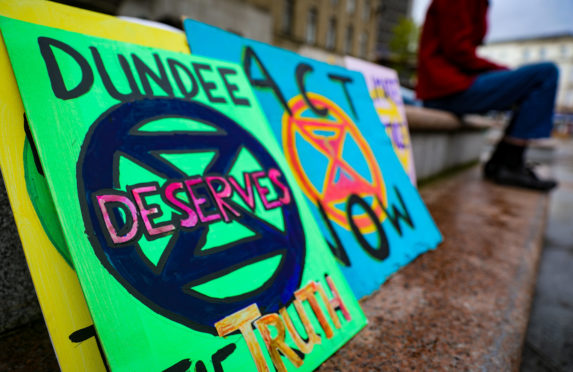A Dundee University professor is calling for online climate campaigners to turn social media “likes” into real action.
Professor Mel Woods, the leader of a Europe-wide environmental project, said while campaign groups such as Extinction Rebellion generate publicity, they lack the ability to provoke change.
Instead, local environmental initiatives should be activists’ focus.
Greta Thunberg, the teenage environmental activist has gained almost three million followers on Twitter, where people show support on climate issues.
However, meaningful change could be made if such online figures work together, according to Professor Mel Woods.
Professor Woods, the academic lead for the university’s Grow Observatory, will promote the role of “citizen science” when she hosts the next Dundee Arts Café on November 12.
She said: “It’s great if you can sign a petition, join a protest or like a social media post by Greta Thunberg, but to take real action to address climate change means getting involved.
“Climate change is a complex matter and can be hard to grasp. That’s why so many people feel that anything they do to tackle it is insignificant, particularly when you see the impact of large polluters such as China and the United States.
“Many activists are motivated by the prospect of backing a campaign, but what is actually needed is people providing practical support to projects that make a difference.”
Citizen science consists of series of projects where people across the world come together to monitor how the planet is changing.
Led by the university’s Duncan of Jordanstone College of Art and Design, the Grow Observatory brings together 18 partner organisations to gather data on soil across Europe.
It distributes free sensors to volunteers across the continent who monitor soil conditions. The findings help food producers adapt their methods to climate change.
The information is also being utilised by the European Space Agency’s Sentinel-1 satellites, allowing scientists to predict extreme weather events.
Having led the initiative that united hundreds of volunteers across Europe, Professor Woods says that she hopes her talk will encourage more people to particular in similar schemes.
She added: “Influencing policy through peaceful means is critical, and the best way to do that is by having data to support our message.
“That’s why citizen science is crucial if climate change is to be tackled.”
Professor Wood’s talk ‘Solving Environmental Issues Together’ takes place in the McManus Gallery at 6pm on Tuesday, November 12.
Attendance is free, but an increase in demand means tickets much been booked in advance at
https://www.eventbrite.co.uk/e/solving-environmental-issues-together-dundee-arts-cafe-tickets-76419483733










